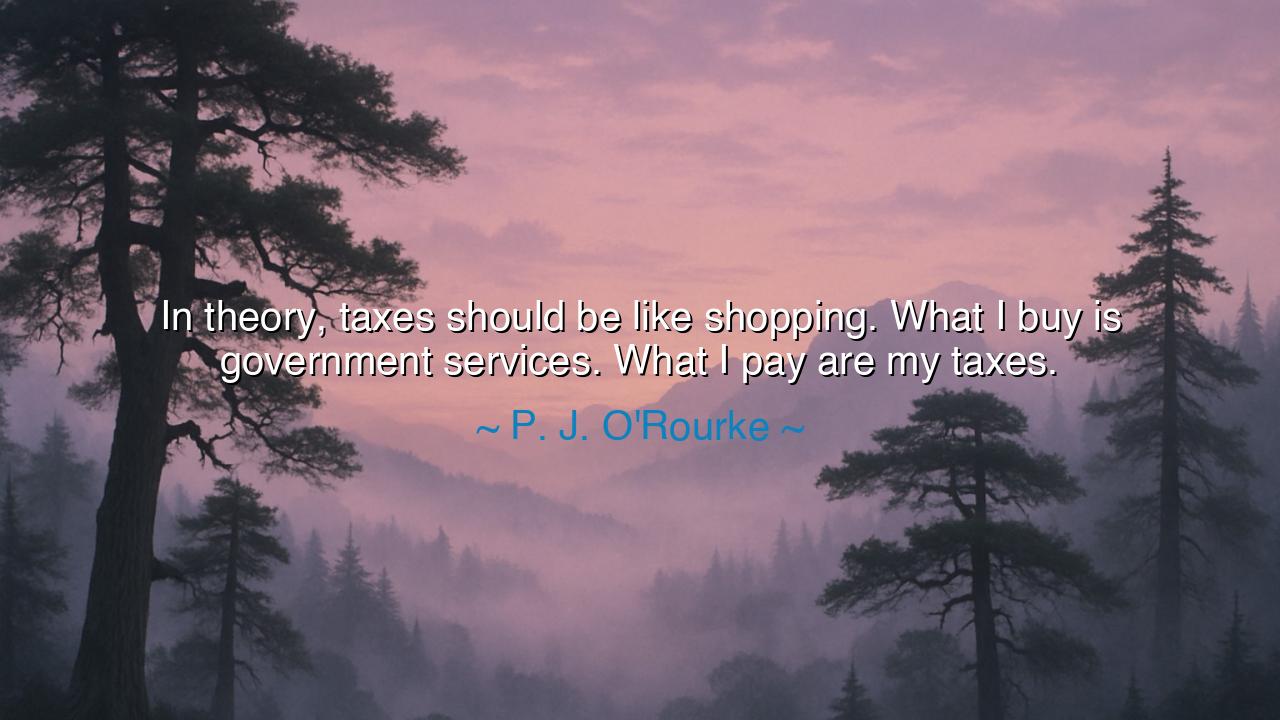
In theory, taxes should be like shopping. What I buy is
In theory, taxes should be like shopping. What I buy is government services. What I pay are my taxes.






In the realm where wit meets wisdom, the American satirist P. J. O’Rourke spoke a truth that cuts through both humor and hypocrisy:
"In theory, taxes should be like shopping. What I buy is government services. What I pay are my taxes."
Though born from jest, these words carry the gravity of political philosophy. O’Rourke, a keen observer of the modern state, sought to remind us that taxation, at its core, is not meant to be a burden imposed upon the unwilling, but a fair exchange between citizen and government — a sacred covenant between the governed and those who govern. His humor cloaks a warning: that when government ceases to deliver value for what it collects, when the taxes of the people no longer reflect the services they receive, the contract between ruler and citizen begins to erode. What should feel like an act of contribution begins to feel like theft, and where mutual benefit should reign, resentment takes root.
The meaning of this quote lies in the delicate balance between obligation and trust. In O’Rourke’s vision, the people are not mere subjects paying tribute; they are participants in a grand market of governance. Just as one would not pay for an empty basket, citizens should not fund waste, corruption, or incompetence. Taxes, in theory, are the price of civilization — the means by which roads are paved, justice administered, and peace maintained. But for this system to be just, the people must see their taxes transformed into tangible good: safe streets, fair courts, honest leadership, and opportunity for all. When the exchange becomes one-sided — when citizens pay but do not benefit — the moral fabric of the state begins to fray.
The origin of O’Rourke’s insight emerges from his lifelong study of liberty and power. As a political satirist, he wielded laughter like a sword, cutting through the illusion that government is infallible. Living in the late twentieth century, he witnessed the rise of bureaucratic excess, where layers of administration consumed wealth faster than they produced results. His remark about taxes as shopping is not merely a jest, but a rebuke to the distance between government and the governed — a reminder that rulers, like merchants, must serve the people with accountability and fairness, not arrogance and waste. Through irony, he spoke the truth: that when citizens feel robbed rather than served, faith in democracy falters.
History, too, bears witness to this lesson. In the eighteenth century, the British Crown taxed the American colonies without giving them representation. “No taxation without representation” became the cry of a revolution, not because men refused to pay, but because they refused to pay without choice. They demanded a voice in what they bought — in how their taxes were spent, and on whose behalf. What began as a question of taxes became a question of justice, of whether a government serves or exploits its people. From this struggle was born a new republic, founded on the principle that the power to tax must always be bound to the consent of the governed. O’Rourke’s humor, centuries later, echoes that same ancient truth: that when the exchange between people and government becomes unjust, freedom itself is at risk.
The quote also exposes a deeper irony — that in modern times, many citizens pay taxes yet feel alienated from the very system their money sustains. They see grand speeches of reform, yet experience broken infrastructure; they fund education, yet find classrooms starving for resources; they contribute to welfare, yet witness the persistence of inequality. The disconnect between payment and service, between contribution and outcome, breeds disillusionment. O’Rourke’s words, though delivered in jest, call upon both rulers and citizens to bridge this gap — for the health of a nation depends upon a shared belief that government serves not itself, but the people who sustain it.
Yet his insight is not only criticism; it carries a lesson of empowerment. If taxes are like shopping, then citizens must also become discerning buyers — not passive consumers, but active participants. They must question where their money goes, demand transparency, and hold leaders accountable for every coin spent in their name. Likewise, those in power must remember that they are custodians, not owners, of public wealth. The true art of governance lies in stewardship: in ensuring that every tax collected returns to the people as justice, welfare, or opportunity.
So let this teaching be preserved for future generations: taxation is the measure of trust between citizen and state. When it is fair, transparent, and fruitful, a nation thrives in harmony; when it becomes hidden, oppressive, or wasteful, the people grow restless and the spirit of democracy decays. P. J. O’Rourke, in his playful wisdom, reminds us that laughter can reveal truth — that humor, when sharpened by justice, can awaken even the sleepiest of societies.
Thus ends the teaching: Pay not only your taxes, but your attention. Watch where your wealth goes, and demand that it returns in kind. For a government that honors its people’s contributions is a government that honors the very soul of the nation — the invisible covenant that binds freedom, service, and trust together under the bright banner of responsibility.






AAdministratorAdministrator
Welcome, honored guests. Please leave a comment, we will respond soon